| Srl | Item |
| 1 |
ID:
127630
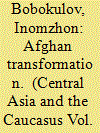

|
|
|
|
|
| Publication |
2013.
|
| Summary/Abstract |
This article examines the Afghan transformation that has been manifesting itself in such spheres as security, politics, and the economy. It is fed by the withdrawal of the international forces from Afghanistan. But, according to the author, this process, which is of an all-encompassing and systemic nature, is having a direct effect on the key aspects of society's vital activity, as well as, due to Afghanistan's particular geopolitical position, on the situation in Central and South Asia. Political and ethnic fragmentation is the main component in the current internal Afghan situation.
|
|
|
|
|
|
|
|
|
|
|
|
|
|
|
|
| 2 |
ID:
102112
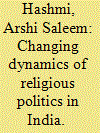

|
|
|
| 3 |
ID:
103244
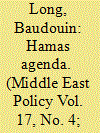

|
|
|
| 4 |
ID:
091389


|
|
|
|
|
| Publication |
2009.
|
| Summary/Abstract |
The February 2009 Swat deal between the Taliban and the Pakistan Government, the current Pakistani Army offensive against Taliban strongholds in various areas of Federally Administered Triabal Tribal Areas (FATA) and the North West Frontier Province (NWFP), and the Talibani response to those operations through terror attacks in various Pakistani cities, sharply underline the clear and present threat to Pakistan.
|
|
|
|
|
|
|
|
|
|
|
|
|
|
|
|
| 5 |
ID:
119927
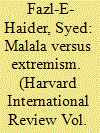

|
|
|
|
|
| Publication |
2012.
|
| Summary/Abstract |
In October 2012, Malala Yousafzai was shot by the Taliban in Pakistan's northwestern town of Swat when she was returning home from school in a van. Why did the Taliban perceive a schoolgirl as a grave threat to its agenda of radicalizing youth? Armed with pen, enlightened with knowledge, and charged with the passion of fighting for the right to girls' education, 14-year-old Malala has had no less of an impact than a drone in combating Talibanization.
|
|
|
|
|
|
|
|
|
|
|
|
|
|
|
|
| 6 |
ID:
093741
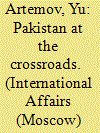

|
|
|
|
|
| Publication |
2009.
|
| Summary/Abstract |
The Islamic Republic of Pakistan (IRP) - one of the largest Muslim states (the fifth largest in the world) and the only one that has nuclear weapons - is currently going through what is probably the most difficult period in its history. A combination of the growing terrorist threat, fueled by radical Islamism, Talibanization, ethnic separatism, and financial and economic difficulties has caused a deep, countrywide crisis.
|
|
|
|
|
|
|
|
|
|
|
|
|
|
|
|
| 7 |
ID:
113265
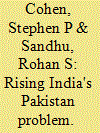

|
|
|
|
|
| Publication |
2010.
|
| Summary/Abstract |
This article identifies the persistent India-Pakistan rivalry as a paired minority conflict and argues that, as the predominant actor, India needs to shed its historical complexes and engage Pakistan proactively. By transcending its traditional reluctance, fears and prejudices, India must demonstrate that it can make use of its recently established economic and socio-political clout to be a dominant force in the region. A review of different scenarios for the future of Pakistan and possible Indian responses to another terrorist attack on Mumbai indicates that India's best option would be to evolve a multilevel and long-term 'carrot and stick' strategy towards its neighbour. Beyond ineffectual Track II dialogues, an excessive focus on Kashmir and myopic decisions determined by domestic contingencies, India needs to build the necessary trust and solve its Pakistan problem by focusing on deeper economic interdependence and sustained civil society contacts, and revive its nuclear disarmament plans.
|
|
|
|
|
|
|
|
|
|
|
|
|
|
|
|
| 8 |
ID:
083820
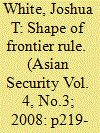

|
|
|
|
|
| Publication |
2008.
|
| Summary/Abstract |
This essay examines British colonial debates about governance in India as a means of positing an analytical framework in which to address the current crises of governance in Pakistan's frontier. In light of the collapse of the antiquated system of tribal governance in the Federally Administered Tribal Areas (FATA), and the spread of insurgent Talibanization into the heart of the ethnically Pashtun settled areas, this analysis maps several possible transition paths for governance reform in both the tribal and settled regions, and argues for an incremental approach that minimizes risks to political stability
|
|
|
|
|
|
|
|
|
|
|
|
|
|
|
|
| 9 |
ID:
098886


|
|
|
|
|
| Publication |
2010.
|
| Summary/Abstract |
This study is interested in understanding public opinion in Pakistan toward terror attacks. Specifically, this study explores (1) the general picture of attitudes in Pakistan toward terrorism and (2) which individuals are most likely to support terrorism in Pakistan. The study aims to give insights into how pervasive a support base exists for terrorism as a tactic in Pakistan and it seeks to isolate the individual-level traits that account for the variation we see among Pakistani Muslims regarding their level of acceptance of terrorism against Pakistani and Indian targets. The study finds that a large majority of Pakistanis oppose terrorism but terrorism directed at Indian targets is more tolerated than terrorism against Pakistani targets. The study also finds that those who are most supportive of Talibanization in Pakistan are the most supportive of terrorism.
|
|
|
|
|
|
|
|
|
|
|
|
|
|
|
|
| 10 |
ID:
094049
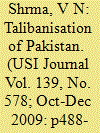

|
|
|
| 11 |
ID:
095452
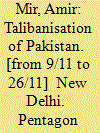

|
|
|
|
|
| Publication |
New Delhi, Pentagon Press, 2009.
|
| Description |
xxv, 422p.
|
| Standard Number |
9788182744332
|
|
|
|
|
|
|
|
|
|
|
|
Copies: C:1/I:0,R:0,Q:0
Circulation
| Accession# | Call# | Current Location | Status | Policy | Location |
| 054930 | 320.958109541/MIR 054930 | Main | On Shelf | General | |
|
|
|
|
| 12 |
ID:
190794


|
|
|
|
|
| Summary/Abstract |
This study explores the post-9/11 ramifications of the Global War on Terror (GWOT) in South Waziristan, Pakistan. It discusses how the post-colonial state has undermined state and tribal political relations which constituted political order first during the British colonial era and later in Pakistan. Furthermore, it explores how the post-colonial state has shared de facto sovereignty in the region with a “good” Taliban in the shape of a peace committee. To understand the Pakistan post-colonial state’s engagement with South Waziristan, it is necessary to make sense of the ongoing GWOT and the resulting necropolitics of life and death in South Waziristan. The paper explores how residents have confronted different scenarios when they encounter the new powerholders. It details the everyday experiences, life stories, and socio-political existence of the people of South Waziristan as an alternative narrative to how mainstream media and academic sources have discussed this area.
|
|
|
|
|
|
|
|
|
|
|
|
|
|
|
|